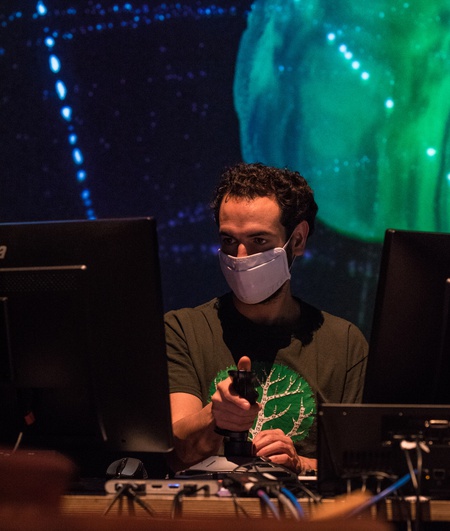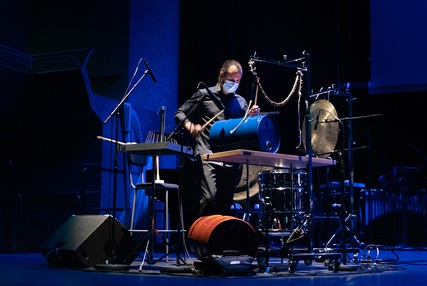Improvise cum machina 2/2
Le 3 décembre dernier, au cours du Grand Soir Numérique qui s’est tenu à la Philharmonie de Paris dans le cadre de la Biennale Nemo des Arts Numériques, trois solistes de l’Ensemble intercontemporain (le trompettiste Lucas Lipari-Mayer, le contrebassiste Nicolas Crosse et le percussionniste Samuel Favre) se sont pour la première fois prêtés à l’expérience d’improviser avec une machine. En l’occurrence, il s’agit de l’environnement informatique OMax – dont le développement, par l’équipe Représentations musicales de l’Ircam, se poursuit dans le cadre du projet REACH (pour Raising co-creativity in cyber-human Musicianship), lauréat d’une bourse ERC Advanced Grant 2019. La machine était pilotée par le musicien Benjamin Lévy, qui a lui-même fait partie de l’équipe Représentations musicales. C’est aujourd’hui au tour de Benjamin Lévy de nous raconter l’expérience.
 De gauche à droite, sur scène lors du concert Grand soir numérique : le percussionniste Samuel Favre, le contrebassiste Nicolas Crosse, le musicien et chercheur Benjamin Lévy et le trompettiste Lucas Lipari-Mayer © Ircam - Centre Pompidou, photo : Quentin Chevrier
De gauche à droite, sur scène lors du concert Grand soir numérique : le percussionniste Samuel Favre, le contrebassiste Nicolas Crosse, le musicien et chercheur Benjamin Lévy et le trompettiste Lucas Lipari-Mayer © Ircam - Centre Pompidou, photo : Quentin Chevrier
Comment avez-vous abordé votre première session de travail avec Lucas, Nicolas et Samuel ?
Benjamin Lévy : Nous avons fait avec eux une session de tests en studio pour leur présenter les différents environnements avec lesquels ils pourraient potentiellement interagir : OMax, Somax, DYCI2… Ils avaient le choix d’utiliser l’un d’entre eux, ou d’en combiner plusieurs. Ils se sont aperçus que DYCI2, par exemple, exigeait de passer par une étape, très importante, de pré-composition de la performance. Or ces musiciens jouent beaucoup de musique écrite au quotidien et ils avaient justement envie de plus de liberté, et de s’affranchir de toute cette partie formelle, de cette dimension « écriture ». D’un commun accord, leur choix s’est donc porté sur OMax. Un OMax pur, avec moi aux manettes et peu de préparation préalable ensemble. C’est un système éprouvé, ce qui nous permettait d’être dans l’instant.
 Comment avez-vous préparé la performance ?
Comment avez-vous préparé la performance ?
B.L. : Nous avons fait plusieurs sessions de travail – quatre en tout, auxquelles s’ajoute la générale avant le concert. On ne peut pas parler vraiment de répétitions : il s’agissait plutôt de se chercher, de se trouver, de faire l’expérience de ce qui fonctionnait et de ce qui ne fonctionnait pas. C’est aussi au cours de ces sessions que Samuel s’est constitué son set d’instruments ad hoc.
Un autre enjeu de ces sessions a été d’équilibrer le dispositif : entre Nicolas Crosse qui, à la contrebasse électrique avec pédales de traitement (sur iPad), envoyait beaucoup de son, les percussions très présentes de Samuel Favre, et le jeu beaucoup plus discret de Lucas Lipari-Mayer… ce n’était pas évident.
Notre temps d’improvisation était limité à 10 minutes. Je leur ai donc demandé s’ils voulaient que l’on se donne une structure. Leur réponse est non : de par leur expérience, ces musiciens ont déjà en tête d’innombrables structures possibles, et ils n’éprouvaient pas le besoin de s’en imposer une en amont.
Nous avons également essayé de faire un plan – nous en avons testés deux. Mais cela n’a pas été concluant. Nous n’avons donc pas convenu de contenu musical prédéterminé, et la mémoire d’OMax (cette bibliothèque dont la machine se sert pour improviser et réagir aux propositions des musiciens) était vide au début de la performance : OMax a donc joué uniquement avec ce que les musiciens ont produit sur scène.
Photo : Benjamin Lévy lors du concert Mécaniques de l'intuition au Centre Pompidou, mars 2021 © Pierre Gondard
Lucas, Nicolas et Samuel sont des musiciens spécialistes de musique dite « contemporaine » : cela leur donne-t-il une approche différente de celle adoptée par des musiciens venant d’autres horizons ?
B.L. : Oui, ça change beaucoup, esthétiquement.
Dans l’élaboration des structures, d’abord. Les musiciens de jazz, par exemple, avec lesquels je travaille fréquemment, sont très habitués à se donner des structures fortes et lisibles, en un mot : audibles. Les musiciens de l’Ensemble intercontemporain sont au contraire habitués à des formes très variées, que l’on ne perçoit pas forcément de manière évidente. La répartition de la parole est donc beaucoup plus empirique que dans le jazz, où elle est très codifiée : au cours de certaines sessions, tout le monde jouait pendant les 10 minutes que durait l’improvisation !
Le matériau sonore, quant à lui, est très influencé par les instruments en présence. Nicolas aime les extrêmes graves. Pour pouvoir s’en détacher, Lucas devait donc nécessairement jouer sur plus de lyrisme et d’aérien – ce qui ne l’empêchait pas de produire des matériaux très abstraits.
Samuel, enfin, jouait sur un autre terrain : celui du rythme, en rapport avec les instruments qu’il a choisis. Et, là encore, la rythmique était très différente de ce qui se fait en jazz. En jazz, on joue avec une pulse fixe, et tout l’enjeu, avec OMax, est d’arriver à le déstructurer. Ici, pas du tout : la pulse est très variable, en fonction des timbres que Samuel va chercher dans son ensemble d’instruments hétéroclites.
Propos recueillis par Jérémie Szpirglas
Concert retransmis dans l'émission d'Arnaud Merlin, le concert de 20h, sur France musique
![]()
Cette action utilise les recherches et logiciels du projet REACH de l’équipe Représentations musicales de l’Ircam dirigé par Gérard Assayag.



